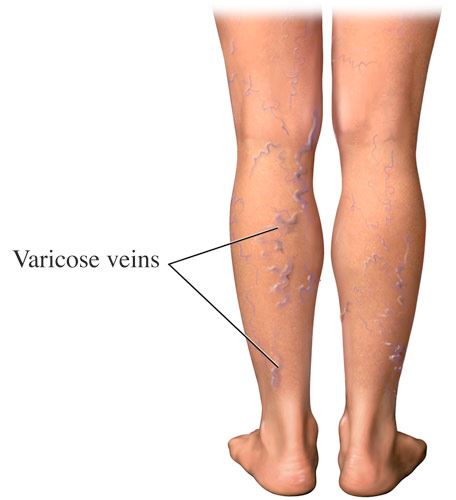Varicose Veins
Veins are blood vessels, with one-way valves, that help keep blood flowing toward your heart. If the valves are weak or damaged, blood can back up and pool in your veins. This causes the veins to swell, which can lead to varicose veins. Varicose veins are enlarged, twisted veins that are visible just under the surface of the skin. Any vein may exhibit varicosity, but the veins most commonly affected are those in your legs and feet.
For many people, varicose veins are simply a cosmetic concern. For others, varicose veins can cause aching pain and discomfort. They often cause few signs and symptoms. If varicose veins cause few symptoms, your doctor may simply suggest making lifestyle changes (avoid standing or sitting for long periods of time, wear compression stockings, etc.). If your symptoms are more severe, your doctor may recommend removal or closure of the varicose veins.

Medical Illustration Copyright © 2019 Nucleus Medical Media, All rights reserved.
Causes of Varicose Veins
There’s no specific cause for varicose veins. However, other conditions, traits or habits may also raise your risk for the disease. These conditions are known as risk factors and include:
Non-Modifiable Risk Factors: These factors are irreversible and cannot be changed. The more of these risk factors you have, the greater your chance of developing varicose veins.
- Family history of varicose veins.
- Pregnancy
- Menopause
- Older age, typically over 50 years old.
Modifiable Risk Factors: These factors can be modified, treated or controlled through medications or lifestyle changes.
- Standing for long periods of time.
- Obesity or having a body mass index “BMI” of 30 or greater.
Symptoms of Varicose Veins
The primary symptoms of varicose veins are highly visible, misshapen veins, usually on your legs. Other common symptoms felt or seen within your veins include:
- Pain
- Swelling
- Achiness
- Discoloration
Diagnosing Varicose Veins
Your doctor will likely examine your legs and visible veins while you’re sitting or standing to diagnose varicose veins. They may ask you about any pain or symptoms you’re having. Your doctor may also suggest one or more of the following diagnostic tests and procedures:
Treatment of Varicose Veins
In general, doctors are conservative when treating varicose veins. You’ll probably be advised to make changes to your lifestyle, instead of trying more aggressive treatments. Some treatment options include:
Lifestyle Changes
- Avoid sitting for prolonged periods of time.
- Eat a heart-healthy diet.
- Exercise under the directions of your doctor.
- Wear compression stockings to help prevent blood clots in the legs.
- Make and keep appointments to see your doctor for routine check-ups and follow-up tests.
